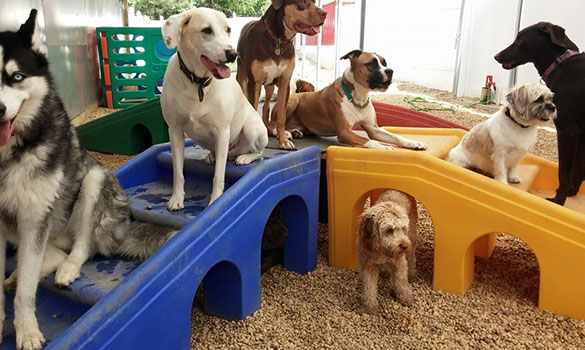If you’re like one of the millions of people whose job has been affected by the COVID-19 pandemic, you’re most likely looking forward to a return to the “normal” ways of just a few months ago. While some may enjoy the experience of working from home and being closer to their loved ones (and beloved pets!) – many have questions about how an impending return to office life might affect some aspects of their current routine.
For pet owners, this issue is particularly important to address. Like humans, dogs adapt to routines and drastic changes can sometimes lead to anxiety. In a recent article on dogster.com, Pamela Reid PhD, CAAB, VP of the ASPCA Behavioral Sciences Team says, “When our regular work and school routines commence again, your dog may be left confused (and lonely!) once everyone is rushing out the door instead of spending time at home.” If your dog seems to have trouble getting used to the changes, our team of pet experts at Halo House Animal Resort has some advice:
Identifying Behaviors
Firstly, it’s necessary to learn how your dog is reacting to changes in his or her environment. Is your dog crying or wimpering more often now that you’ve gone back to work? Has their mood become more aggressive? In the Dogster article, Pamela advises, “If you notice your pet becoming agitated as you prepare to leave for work or school, that can be a warning sign that your pet is anxious about being left alone. You can potentially prevent the problem from worsening by providing plenty of physical exercise before you leave. Take your dog for a brisk walk, interspersed with plenty of sniffing opportunities, before you leave for the day.”
If your dog’s sleeping or eating habits change, however, this could be a sign of something beyond normal anxiety. Kathy Tanguay, General Manager of Halo House, says, “If your pets are unusually lethargic or not eating; anxiety may be a cause but these can potentially be symptoms of more serious conditions and you should consult your veterinarian.”
A dog that is in good health can still demonstrate physical behaviors that indicate stress or anxiety. Ultimately, it’s important to identify and differentiate anxiety from other conditions to provide your dog with the proper care – and attention – he or she needs.
Finding a “New Normal”
Once you’ve determined the factor(s) causing your pet’s anxiety, you can create a new routine to make them more comfortable. With many Americans going back to work, a suddenly empty home is enough to cause stress for your dog. As Pamela Reid mentions, a little bit of extra activity can help. At Halo House, Kathy Tanguay recommends: “We use our Doggie Day Camp program as a model for what a healthy, happy dog should experience during the average day. Lots of exercise, time to relax and cool off and of course, a healthy diet. It can be hard for many people to keep dogs – especially younger ones – as active as they need to keep them from experiencing excessive anxiety. We employ a team of camp counselors, trainers, groomers and other experts to offer individualized attention and care.”
At Halo House Animal Resort, we specialize in providing unparalleled care for all pets and we offer the best day camp, grooming, training and dog boarding in New Jersey. If your pets need help finding their “new normal”, call us today at (856) 694-0980 or email us at info@halohouseanimalresort.com and ask about how we can help your pet adjust to your new routine. We hope to see you again soon!

